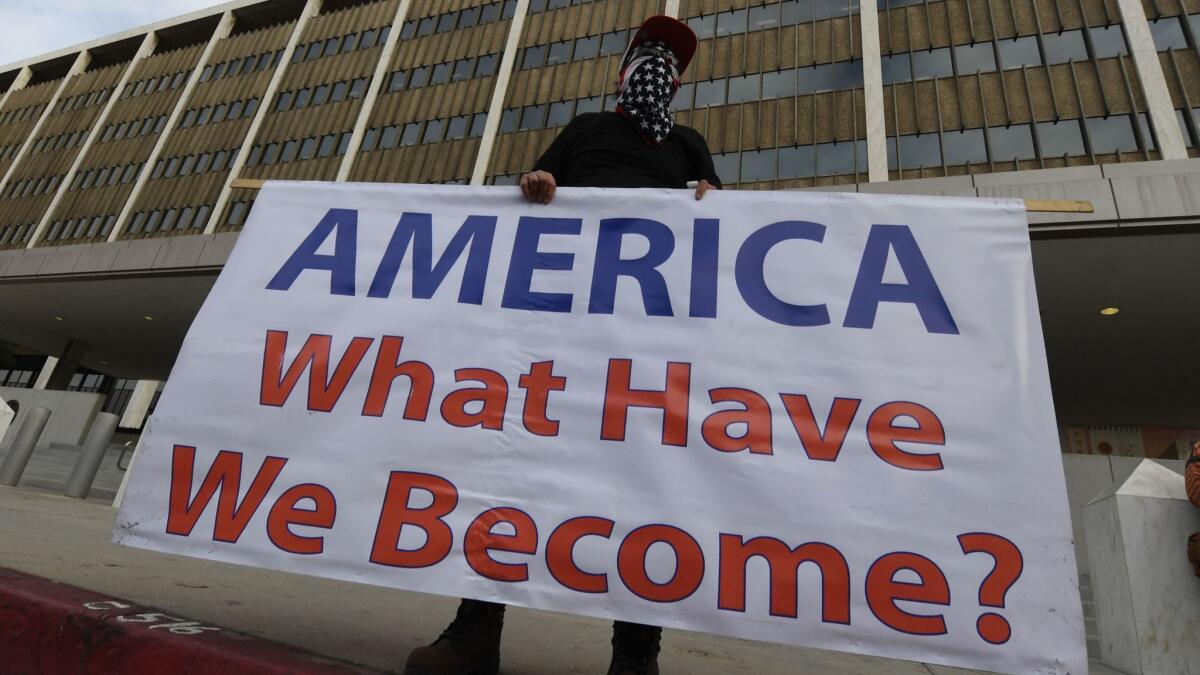Opinion: A new ICE directive limiting arrests in courthouses is a small silver lining in a dark cloud

- Share via
A new immigration enforcement directive bars agents who enter courthouses seeking specific deportable immigrants from detaining anyone other than the targeted person. That’s a thin silver lining in what has been a dark cloud over the heads of 11 million people in the country illegally.
The directive, from acting Immigration and Customs Enforcement Director Thomas Homan (a hard-liner on the issue), formalizes a policy allowing agents to enter courthouses in pursuit of “specific, targeted aliens with criminal convictions, gang members, national security or public safety threats, aliens who have been ordered removed from the United States but have failed to depart, and aliens who have re-entered the country illegally after being removed.”
But the directive instructs agents to leave alone anyone else they encounter who they suspect might not have permission to be in the country.
As a society, we don’t want people, regardless of their legal status, to fear taking part in the legal system.
California Chief Justice Tani G. Cantil-Sakauye, who last year formally complained to ICE about the courthouse visits, welcomed the directive as “a good start. It’s essential that we protect the integrity of our state court justice system and protect the people who use it.”
The underlying policy still poses a significant problem by dissuading people fearing encounters with ICE agents from appearing in courthouses to pay tickets, testify in trials, seek protective orders or any other encounters meant to help preserve public peace.
The new directive notably does not extend to other public facilities, keeping intact Obama-era guidelines that agents should avoid “sensitive locations” such as schools, medical facilities, churches, and civil ceremonies such as weddings and funerals, and public rallies.
The new directive might provide a little breathing room for people needing court help, but it still puts ICE agents in courthouses, which is bad policy.
As a society, we don’t want people, regardless of their legal status, to fear taking part in the legal system, from paying parking fines to filing crime reports to testifying as witnesses. It’s foolhardy to erode that system for the sake of rounding up a few people ICE wants to deport.
This is rejected by most Trump supporters, but arresting and deporting will not resolve our illegal immigration problem. Certainly there are bad actors who need to be sent home, but the vast majority of the 11 million or so people living here illegally — as well as the legal immigrants — are law-abiding members of our communities and our economy who commit crimes at lower rates than native-born Americans.
About two-thirds of people living here without authorization have been among us for more than a decade. These are people with roots and families, and summarily tossing them out would not only be cruel, but would lead to a higher burden on social service systems trying to care for the American citizens the deportees leave behind.
The government should leave the bulk of them alone until Congress figures out a humane and judicious solution to a problem it has let slide for far too long.
Follow my posts and re-tweets at @smartelle on Twitter
More to Read
A cure for the common opinion
Get thought-provoking perspectives with our weekly newsletter.
You may occasionally receive promotional content from the Los Angeles Times.










